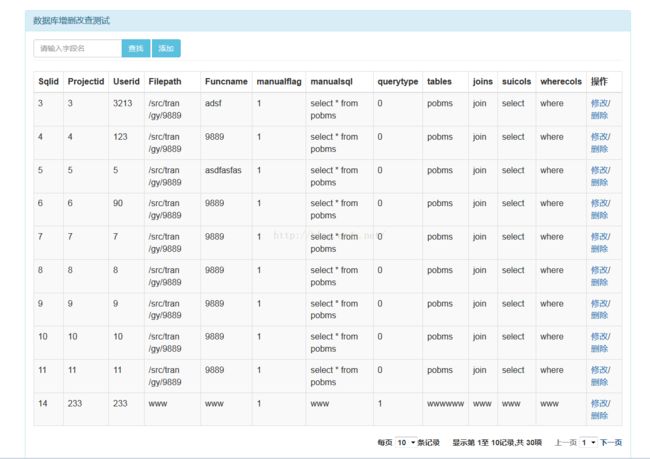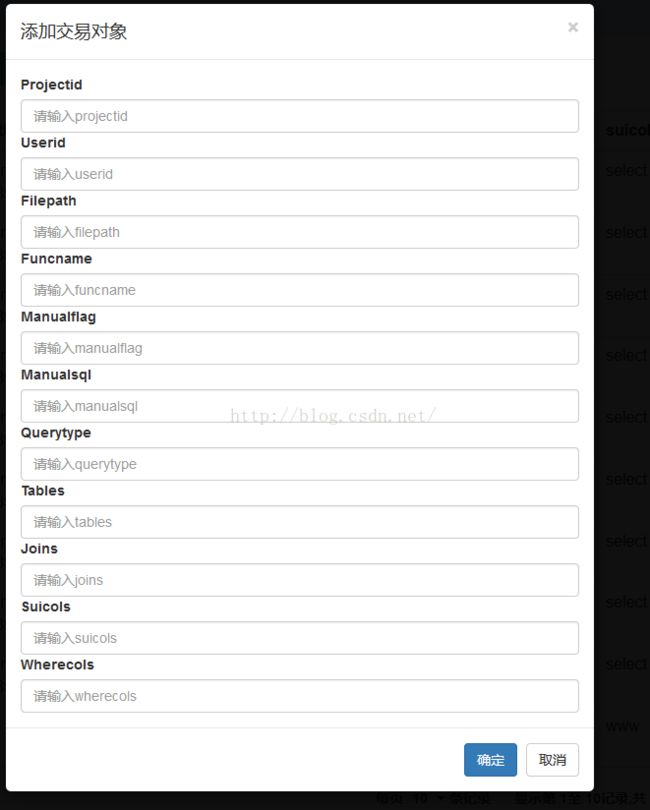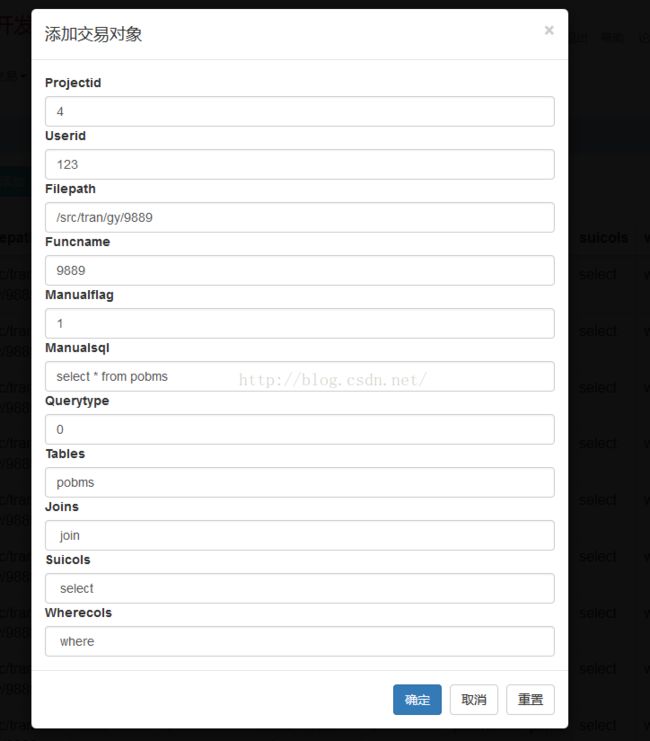手把手教你在springMVC中不用框架写表格
<个人原创,转载请注明出处>
因为项目需要大量的表格,而leader又不允许使用已有的例如DataTables之类的表格框架,所以需要我自己手写一个表格控件
其实现的功能主要有
1.和后台controller交互,取数据,根据取得数据数量在页面显示数据
2.上一页,下一页
3.指定某一页
4.显示当前数据总数,显示的个数
5.修改数据
6.删除数据
7.项目主要使用的技术就是简单的springMVC+Ajax刷新
以上因为是我写的,所以可能在性能方面还有需要优化,基本功能暂时就想到这么多了,下面开始进入正题,最终实现的效果如下所示
第一步,因为我们使用了webservice,所以webservice提供了一系列接口,这里不一一介绍,后面使用到的时候再给大家说
上面正式打开webservice,其中数据库连接使用了jdbc方式,这个和前端也没什么大关系
第二步,主要写了几个文件,分别是table.js,table.jsp,其中js用来画表格和页面,jsp是用来显示
下面具体描述每项功能实现及其方法
a.查找功能
jsp页面代码如下(只摘取重要部分)
<div class="panel-body">
<div class="form-inline" >
<div class="input-group col-md-3" style="margin-top:0px positon:relative">
<input type="text" class="form-control" name="selectName" id="selectName" placeholder="请输入字段名" / >
<span class="input-group-btn">
<button id="selectSqlButton" class="btn btn-info btn-search">查找</button>
<button class="btn btn-info btn-search" data-toggle="modal" data-target="#myModal" style="margin-left:3px">添加</button>
</span>
</div>
</div>
<hr style="margin-top:5px"/>
<!-- 表格,使用ajax返回刷新 -->
<div class="table-responsive" >
<table class="table table-striped table-bordered">
<thead>
<tr>
<th>Sqlid</th>
<th>Projectid</th>
<th>Userid</th>
<th>Filepath</th>
<th>Funcname</th>
<th>manualflag</th>
<th>manualsql</th>
<th>querytype</th>
<th>tables</th>
<th>joins</th>
<th>suicols</th>
<th>wherecols</th>
<th>操作</th>
</tr>
</thead>
<tbody id="sqlTables">
</tbody>
</table>
</div>
<!-- 每页显示几条记录 -->
<div id="bottomTool" style="float:right">
<label>每页
<select id="pageSize" onchange="research()" size="1">
<option selected="selected">10</option>
<option>15</option>
<option>20</option>
<option>30</option>
</select>条记录
</label>
<label>显示第
<label id="startItem"></label>至
<label id="endItem"></label>记录,共
<label id="allItem"></label>项
</label>
<label>
<a id="previousPage" style="color:gray">上一页</a>
<select id="PageNumDetail" onchange="selectPage()" size="1">
</select>
<a id="nextPage" style="color:gray">下一页</a>
</label>
</div>
</div>
</div>
</div>上面代码就是页面涉及到查找功能的部分代码,这里把字段固定了,每个操作都有对应的按钮和id,下面看看table.js文件是怎么实现查找功能的
var SqlForSelect;
/*设置表头不自动换行*/
$(document).ready(function() {
$("th").css("white-space","nowrap");
});
/*更新数据字典表格*/
function refreshTable(sqlTables){
//清空表格
$("#sqlTables").html("");
//根据传入的数据进行循环制表
for(i in sqlTables){
$("#sqlTables").append("<tr><td>"+sqlTables[i].sqlid+
"</td><td>"+sqlTables[i].projectid+
"</td><td>"+sqlTables[i].userid+
"</td><td>"+sqlTables[i].filepath+
"</td><td>"+sqlTables[i].funcname+
"</td><td>"+sqlTables[i].manualflag+
"</td><td>"+sqlTables[i].manualsql+
"</td><td>"+sqlTables[i].querytype+
"</td><td>"+sqlTables[i].tables+
"</td><td>"+sqlTables[i].joins+
"</td><td>"+sqlTables[i].suicols+
"</td><td>"+sqlTables[i].wherecols+
"</td><td>"+"<a href='javascript:void(0)' id='"+sqlTables[i].sqlid+"' onclick='editSql(this)' data-toggle='modal' data-target='#editMyModal'>修改</a>/<a href='javascript:void(0)' id='"+sqlTables[i].sqlid+"' onclick='deleteSql(this)'>删除</a>"+
"</td><tr>");
}
};上面代码先定义一个全局变量SqlForSelect,再设置了th的white-space属性,让其不要自动换行,关于这个,可以参考我写的 jsp中为表格添加水平滚动条这篇文章
接着refreshTable用来刷新页面表格,最后一列添加两个a标签用来响应修改和删除操作
下一步,我们需要写几个函数,分别用来更新页面显示的资源,例如开始和结束条目啊,总个数,控制上下页流程,代码如下
/*更新页面显示开始和结束数目*/
function refreshCount(countOfSqlName,currentPage,numOfPage){
document.getElementById("allItem").innerHTML = countOfSqlName;
var startItem=0;
var endItem=0;
var itemsPerPage = getItemsPerPage();
if(currentPage<numOfPage){
startItem=--currentPage*itemsPerPage;
endItem=parseInt(startItem)+parseInt(itemsPerPage);
startItem++;
}else if(currentPage==numOfPage){
startItem=--currentPage*itemsPerPage;
endItem=countOfSqlName;
startItem++;
}
document.getElementById("startItem").innerHTML = startItem;
document.getElementById("endItem").innerHTML = endItem;
};将ajax传过来的数据分别放入到页面标签内容中,关于显示当前页面显示的记录从多少条到多少条的算法就不做说明,下一步代码如下所示
/*更新当前页面以及控制上下页显示逻辑*/
function refreshCurrentPage(numOfPage,currentPage){
$("#PageNumDetail").html("");
var i=1;
for(i=1;i<=numOfPage;i++){
$("#PageNumDetail").append("<option>"+i+"</option>");
}
//设置当前页面值
var select = document.getElementById("PageNumDetail");
var currentPageForSql = currentPage;
//options[]下标从0开始
select.options[--currentPageForSql].selected = true;
//判断页面如果为第一页,则将上一页设为不可选,如果不为第一页,则将按钮置为可选
if(currentPage <= 1){
$("#previousPage").removeAttr("href");
$("#previousPage").css("color","grey");
}else if(currentPage >1){
$("#previousPage").attr("href","javascript:previousPage()");
$("#previousPage").css("color","#23528C");
}
if (currentPage >= numOfPage){
$("#nextPage").removeAttr("href");
$("#nextPage").css("color","grey");
}else{
$("#nextPage").attr("href","javascript:nextPage()");
$("#nextPage").css("color","#23528C");
}
};上述代码用来控制页面上下页码显示逻辑,在第一页,上一页不可选,最后一页,下一页不可选
/*获得页面的currentPage和 getItemsPerPag*/
function getCurrentPage(){
return $('#PageNumDetail option:selected').val();
};
function getItemsPerPage(){
return $('#pageSize option:selected').val();
};上述代码用来对当前页的select控件进行控制,自动调节到当前页码
=======================================
上面的几个函数介绍完以后,我们看看ajax来请求查找命令是怎么实现的,代码如下
/*执行查找命令*/
$(function(){
$('#selectSqlButton').click(function(){
var selectSqlName = $('#selectName').val();
$.ajax({
type : "GET",
url : "SelectSqlByName.do",
data : {"selectName":selectSqlName,"currentPage":0,"itemsPerPag":10},
dataType: "json",
error: function(){
alertLogin();
},
success : function(msg) {
if(msg.errorInfo == 0){
refreshTable(msg.sqls);
refreshCurrentPage(msg.numOfPage,msg.currentPage);
refreshCount(msg.countOfSqlName,msg.currentPage,msg.numOfPage);
}else
alert("查无数据");
}
});
});
});通过
$('#selectName').val()获得用户输入的查找命令,向controller发送SelectSqlByName请求,传入页面参数,在success里面进行几个页面的刷新
接下来,看看conrtoller里面是如何匹配到selectSqlByName这个方法的
@RequestMapping(value = "/SelectSqlByName",method = RequestMethod.GET,produces
={"application/json;charset=UTF-8"})
public @ResponseBody Map<String, Object> listSqls(Model model,HttpServletRequest request,HttpServletResponse res) {
//每次都查询,避免数据字典改变
Map<String, Object> map = new HashMap<String, Object>();
int errorInfo = 0;
Integer currentPage = Integer.parseInt(request.getParameter("currentPage"));
Integer itemsPerPag = Integer.parseInt(request.getParameter("itemsPerPag"));
String selectName = request.getParameter("selectName");
long begin =System.currentTimeMillis();
//这里使用的是webservice接口函数
factory = new ClientProxyFactoryBean();
factory.setAddress("http://localhost:9000/Hello");
factory.getServiceFactory().setDataBinding(new AegisDatabinding());
client = factory.create(HelloWorld.class);
List<Cptsql> list = client.pageSelectCptsql(selectName, currentPage, itemsPerPag);
long end =System.currentTimeMillis();
System.out.println("两个时间差为:"+(end-begin));
//取页码数目
int countOfDicName = client.pageSelectCptsqlCount(selectName);
if (countOfDicName == 0){
errorInfo = 1;
currentPage=1;
map.put("currentPage", currentPage);
map.put("errorInfo",errorInfo);
return map;
}else{
double tempDouble = itemsPerPag;
double numOfPage = Math.ceil(countOfDicName/tempDouble);
errorInfo = 0;
currentPage=1;
map.put("countOfSqlName", countOfDicName);
map.put("sqls", list);
map.put("numOfPage", numOfPage);
map.put("currentPage", currentPage);
map.put("errorInfo",errorInfo);
return map;
}
} 调用了webservice函数,这个函数实现不多做说明,如果没有学过webservice可以自己写一个service和implement实现,做一个挡板进行数据的伪造
到这里,查找功能基本实现了
b.上下页
上下页码的实现很简单,用的也是ajax请求
/*获取下一页*/
function nextPage(){
//参数获取
var currentPage = getCurrentPage();
var itemsPerPage = getItemsPerPage();
var selectSqlName = $('#selectName').val();
var getNextPage = 1;
$.ajax({
type : "GET",
url : "SelectNextPageForSql.do",
data : {"selectName":selectSqlName,"currentPage":currentPage,"itemsPerPag":itemsPerPage},
dataType: "json",
error: function(){alertLogin();},
success : function(msg) {
$('#sqlid').val(msg.sqls);
refreshTable(msg.sqls);
refreshCurrentPage(msg.numOfPage,msg.currentPage);
refreshCount(msg.countOfSqlName,msg.currentPage,msg.numOfPage);
refreshFooter();
}
});
};
/*获取上一页*/
function previousPage(){
//参数获取
var currentPage = getCurrentPage();
var itemsPerPage = getItemsPerPage();
var selectSqlName = $('#selectName').val();
var getPreviousPage = 0;
$.ajax({
type : "GET",
url : "SelectPreviousPageForSql.do",
data : {"selectName":selectSqlName,"currentPage":currentPage,"itemsPerPag":itemsPerPage},
dataType: "json",
error: function(){alertLogin();},
success : function(msg) {
refreshTable(msg.sqls);
refreshCurrentPage(msg.numOfPage,msg.currentPage);
refreshCount(msg.countOfSqlName,msg.currentPage,msg.numOfPage);
refreshFooter();
}
});
};关于controller里面对上下页的匹配这里就不多做阐述了,主要就是针对传入的数据,将currentPage进行增减,再调用service函数,从而达到获取上下页的效果
C.指定某一页
同样的,直接从ajax请求谈起,代码如下
/*指定某一页操作*/
function selectPage(){
//参数获取
var currentPage = getCurrentPage();
var itemsPerPage = getItemsPerPage();
var selectSqlName = $('#selectName').val();
var getPreviousPage = 0;
$.ajax({
type : "GET",
url : "SelectPageForSql.do",
data : {"selectName":selectSqlName,"currentPage":currentPage,"itemsPerPag":itemsPerPage},
dataType: "json",
error: function(){alertLogin();},
success : function(msg) {
refreshTable(msg.sqls);
refreshCurrentPage(msg.numOfPage,msg.currentPage);
refreshCount(msg.countOfSqlName,msg.currentPage,msg.numOfPage);
refreshFooter();
}
});
}这里使用的方法是selctPage(),通过之前页面定义的
<select id="PageNumDetail" onchange="selectPage()" size="1">当数值有change的时候就会触发这个方法,并将相应的参数发给controller,获得数据,最后调用统一的refresh函数
D.添加功能
添加功能在这里主要涉及到bootstrap的modal框的使用,效果如下所示,点击页面添加按钮,弹出modal框
控制这个窗口的jsp代码是
<!-- 添加模态框(Modal) --> <div class="modal fade" id="myModal" tabindex="-1" role="dialog" aria-labelledby="myModalLabel" aria-hidden="true"> <div class="modal-dialog"> <div class="modal-content"> <div class="modal-header"> <button type="button" class="close" data-dismiss="modal" aria-hidden="true"> × </button> <h4 class="modal-title" id="myModalLabel"> 添加交易对象 </h4> </div> <div class="modal-body"> <label>Projectid</label><input type="text" name="projectid" class="form-control" id="projectidForAdd" placeholder="请输入projectid" / > <label>Userid</label><input type="text" name="userid" class="form-control" id="useridForAdd" placeholder="请输入userid" / > <label>Filepath</label><input type="text" name="filepath" class="form-control" id="filepathForAdd" placeholder="请输入filepath" / > <label>Funcname</label><input type="text" name="funcname" class="form-control" id="funcnameForAdd" placeholder="请输入funcname" / > <label>Manualflag</label><input type="text" name="manualflag" class="form-control" id="manualflagForAdd" placeholder="请输入manualflag" / > <label>Manualsql</label><input type="text" name="manualsql" class="form-control" id="manualsqlForAdd" placeholder="请输入manualsql" / > <label>Querytype</label><input type="text" name="querytype" class="form-control" id="querytypeForAdd" placeholder="请输入querytype" / > <label>Tables</label><input type="text" name="tables" class="form-control" id="tablesForAdd" placeholder="请输入tables" / > <label>Joins</label><input type="text" name="joins" class="form-control" id="joinsForAdd" placeholder="请输入joins" / > <label>Suicols</label><input type="text" name="suicols" class="form-control" id="suicolsForAdd" placeholder="请输入suicols" / > <label>Wherecols</label><input type="text" name="wherecols" class="form-control" id="wherecolsForAdd" placeholder="请输入wherecols" / > </div> <div class="modal-footer"> <button id="addSql" class="btn btn-primary" data-dismiss="modal"> 确定 </button> <button type="button" class="btn btn-default" data-dismiss="modal">取消 </button> </div> </div><!-- /.modal-content --> </div><!-- /.modal --> </div>通过
<button class="btn btn-info btn-search" data-toggle="modal" data-target="#myModal" style="margin-left:3px">添加</button>这个button的data-toggle和data-target属性,点击添加按钮,会打开模态框,在模态框内将布局写好,最后在modal-footer里,点击确定,触发js里对应的方法,js代码如下
/*这是Ajax添加选项*/
$(function() {
$("#addSql").click(function() {
var projectid=$("#projectidForAdd").val();
var userid=$("#useridForAdd").val();
var filepath=$("#filepathForAdd").val();
var funcname=$("#funcnameForAdd").val();
var manualflag=$("#manualflagForAdd").val();
var manualsql=$("#manualsqlForAdd").val();
var querytype=$("#querytypeForAdd").val();
var tables=$("#tablesForAdd").val();
var joins=$("#joinsForAdd").val();
var suicols=$("#suicolsForAdd").val();
var wherecols=$("#wherecolsForAdd").val();
$.ajax( {
type : "GET",
url : "addSql.do",
data : {"projectid":projectid,"userid":userid,"filepath":filepath,"funcname":funcname,"manualflag":manualflag,"manualsql":manualsql,"querytype":querytype,"tables":tables,"joins":joins,"suicols":suicols,"wherecols":wherecols},
contentType : "application/json",
dataType: "json",
error: function(){alertLogin();},
success : function(msg) {
alert('恭喜你,添加成功!');
refreshTable(msg.list);
refreshCurrentPage(msg.numOfPage,msg.currentPage);
refreshCount(msg.countOfSqlName,msg.currentPage,msg.numOfPage);
refreshFooter();
}
});
});
});
这段js代码首先获得用户在模态框里输入的值,在把这些参数传到controller( 后期可以考虑将这些数据组成map进行发送)
controller部分对于这个addSql的操作为
//添加
@RequestMapping(value = "/addSql",method = RequestMethod.GET,produces
={"application/json;charset=UTF-8"})
public @ResponseBody Object addObject(HttpServletRequest request,HttpServletResponse res) throws UnsupportedEncodingException{
//将传进来的文字进行编码,不然会出现中文乱码错误
Map<String, Object> map = new HashMap<String, Object>();
int currentPage = 0;
int itemsPerPag = 10;
String projectid = new String(request.getParameter("projectid").getBytes("ISO-8859-1"),"utf-8") ;
String userid = new String(request.getParameter("userid").getBytes("ISO-8859-1"),"utf-8") ;
String filepath=new String(request.getParameter("filepath").getBytes("ISO-8859-1"),"utf-8") ;
String funcname=new String(request.getParameter("funcname").getBytes("ISO-8859-1"),"utf-8") ;
String manualflag=new String(request.getParameter("manualflag").getBytes("ISO-8859-1"),"utf-8") ;
String manualsql=new String(request.getParameter("manualsql").getBytes("ISO-8859-1"),"utf-8") ;
String querytype=new String(request.getParameter("querytype").getBytes("ISO-8859-1"),"utf-8") ;
String tables=new String(request.getParameter("tables").getBytes("ISO-8859-1"),"utf-8") ;
String joins=new String(request.getParameter("joins").getBytes("ISO-8859-1"),"utf-8") ;
String suicols=new String(request.getParameter("suicols").getBytes("ISO-8859-1"),"utf-8") ;
String wherecols=new String(request.getParameter("wherecols").getBytes("ISO-8859-1"),"utf-8") ;
factory = new ClientProxyFactoryBean();
factory.setAddress("http://localhost:9000/Hello");
factory.getServiceFactory().setDataBinding(new AegisDatabinding());
client = factory.create(HelloWorld.class);
int maxId = client.maxSqlid();
com.spdb.domain.Cptsql addObj = new com.spdb.domain.Cptsql();
addObj.setSqlid(maxId+1);
addObj.setFilepath(filepath);
addObj.setFuncname(funcname);
addObj.setJoins(joins);
addObj.setManualflag(manualflag);
addObj.setManualsql(manualsql);
addObj.setProjectid(new Integer(projectid));
addObj.setQuerytype(querytype);
addObj.setSuicols(suicols);
addObj.setTables(tables);
addObj.setUserid(new Integer(userid));
addObj.setWherecols(wherecols);
//存储objTemp
client.insertCptsql(addObj);
//查找并返回
int countOfSqlName = client.pageSelectCptsqlCount(funcname);
List<com.spdb.domain.Cptsql> list = client.pageSelectCptsql(
funcname, currentPage, itemsPerPag);
currentPage=1;
//取页码数目,实时刷新,保证没有垃圾数据
double tempDouble = 10;
double numOfPage = Math.ceil(countOfSqlName/tempDouble);
map.put("countOfSqlName", countOfSqlName);
map.put("list", list);
map.put("numOfPage", numOfPage);
map.put("data", "data");
map.put("currentPage", currentPage);
return map;
}
注意这里要使用到
<span style="color:#FF0000;">produces={"application/json;charset=UTF-8"
</span><pre name="code" class="javascript">和(request.getParameter("projectid").getBytes("ISO-8859-1"),"utf-8"
对数据页面传入的字符串和传回给页面的字符串进行编码,避免产生乱码
主要的操作就和我在代码中备注的一样,其中同样调用的是webservice的方法
client.insertCptsql(addObj);进行添加,最后再通过添加的名字来获取所有同名的字符,相当于再做一次查找,返回给页面,从而对用户视觉有良好的过度效果
E.修改功能
修改功能和添加功能类似,都是使用的modal窗口进行的,其中在jsp代码方面,和 添加的唯一不同的地方在于
<div class="modal-footer"> <button id="editObj" class="btn btn-primary" data-dismiss="modal"> 确定 </button> <button type="button" class="btn btn-default" data-dismiss="modal">取消 </button> <button type="button" class="btn btn-default" id="test" onclick="refreshModalWhenEdit()">重置 </button> </div>这里添加了重置功能,其具体实现的流程如下
需要说明的是,这里当用户点击修改功能按钮的时候,会弹出当前的项目的值,如下图所示
点击后,出现原来的值,这个是怎么实现的呢?很简单,通过js代码控制,让我们看看js代码
"</td><td>"+"<a href='javascript:void(0)' id='"+sqlTables[i].sqlid+"' onclick='editSql(this)' data-toggle='modal' data-target='#editMyModal'>修改</a>/<a href='javascript:void(0)' id='"+sqlTables[i].sqlid+"' onclick='deleteSql(this)'>删除</a>"+
//修改操作
function editSql(obj)
{
$.ajax( {
type : "GET",
url : "GetSqlByIdForUpdate.do",
data : {"sqlid":obj.id},
contentType : "application/json",
dataType: "json",
// error: function(){alertLogin();},
success : function(msg) {
SqlForSelect = msg.selectSql;
refreshModalWhenEdit();
}
});
}这两段代码,第一段是之前refreshtable()方法里面的一段,点击修改以后,触发editSql方法,将this传给editSql中的obj参数,然后调用ajax请求,将obj.id发给后台,后台再查询一次数据(为什么要每次都要查询,因为有可能在用户点击修改的时候,后台数据库发生变化,所以这时候需要再查询一次,后期可以通过广播方式进行通知,判断)
最后置全局变量SqlForSelect为获取的值,调用refreshModalWhenEdit方法,那么这个方法是如何定义的呢,很简单
/*控制修改页面显示原值*/
function refreshModalWhenEdit(){
document.getElementById("projectidForEdit").value=SqlForSelect.projectid;
document.getElementById("useridForEdit").value = SqlForSelect.userid;
document.getElementById("filepathForEdit").value = SqlForSelect.filepath;
document.getElementById("funcnameForEdit").value =SqlForSelect.funcname;
document.getElementById("manualflagForEdit").value = SqlForSelect.manualflag;
document.getElementById("manualsqlForEdit").value = SqlForSelect.manualsql;
document.getElementById("querytypeForEdit").value = SqlForSelect.querytype;
document.getElementById("tablesForEdit").value = SqlForSelect.tables;
document.getElementById("joinsForEdit").value = SqlForSelect.joins;
document.getElementById("suicolsForEdit").value =SqlForSelect.suicols;
document.getElementById("wherecolsForEdit").value = SqlForSelect.wherecols;
}简单的说就是把modal框里的值一个个填充进去(
目前这里可能造成显示先后顺序的问题,如果网络卡的情况下,可能页面出现一段事件后里面才会填充,目前由于公司开发使用统一的内网,暂时未出现此问题)
最后用户点击确定的时候,调用
$(function() {
$("#editObj").click(function() {
var sqlId= SqlForSelect.sqlid;
var projectid=$("#projectidForEdit").val();
var userid=$("#useridForEdit").val();
var filepath=$("#filepathForEdit").val();
var funcname=$("#funcnameForEdit").val();
var manualflag=$("#manualflagForEdit").val();
var manualsql=$("#manualsqlForEdit").val();
var querytype=$("#querytypeForEdit").val();
var tables=$("#tablesForEdit").val();
var joins=$("#joinsForEdit").val();
var suicols=$("#suicolsForEdit").val();
var wherecols=$("#wherecolsForEdit").val();
$.ajax( {
type : "GET",
url : "editSql.do",
data : {"sqlId":sqlId,"projectid":projectid,"userid":userid,"filepath":filepath,"funcname":funcname,"manualflag":manualflag,"manualsql":manualsql,"querytype":querytype,"tables":tables,"joins":joins,"suicols":suicols,"wherecols":wherecols},
contentType : "application/json",
dataType: "json",
// error: function(){alertLogin();},
success : function(msg) {
alert('恭喜你,修改成功!');
refreshTable(msg.list);
refreshCurrentPage(msg.numOfPage,msg.currentPage);
refreshCount(msg.countOfSqlName,msg.currentPage,msg.numOfPage);
refreshFooter();
}
});
});
});发送请求即可,后台的controller就不多做说明了,和添加类似
关于重置方法的实现很简单,点击重置按钮,再调用
refreshModalWhenEdit()即可
F.删除功能
删除功能的实现更简单了,用户点击删除 按钮以后
//删除操作
function deleteSql(obj)
{
var selectSqlName = $('#selectName').val();
$.ajax( {
type : "GET",
url : "deleteSql.do",
data : {"sqlid":obj.id,"selectSqlName":selectSqlName},
contentType : "application/json",
dataType: "json",
success : function(msg) {
alert("删除成功");
refreshTable(msg.list);
refreshCurrentPage(msg.numOfPage,msg.currentPage);
refreshCount(msg.countOfSqlName,msg.currentPage,msg.numOfPage);
refreshFooter();
}
});
}把id发给后台,调用删除函数即可
这里之所以还要再获取一次selectSqlName是因为用户视觉统一性而言
就是点击删除以后,页面应该再刷新一次,显示刚刚搜索名字的结果(这时候,删除的那条已经不在了)
=====================================
到这里,基本上table的表的这些功能已经实现完了,我是个接触前端开发刚一两个月的新人,说的比较多和繁
总结一下就是js里面控制每个操作的方法,尤其是下面三个共用的方法要高度抽象化,这样为我们代码书写省去了很多麻烦
refreshTable(msg.list); refreshCurrentPage(msg.numOfPage,msg.currentPage); refreshCount(msg.countOfSqlName,msg.currentPage,msg.numOfPage);大家有什么问题欢迎及时指正,谢谢!


